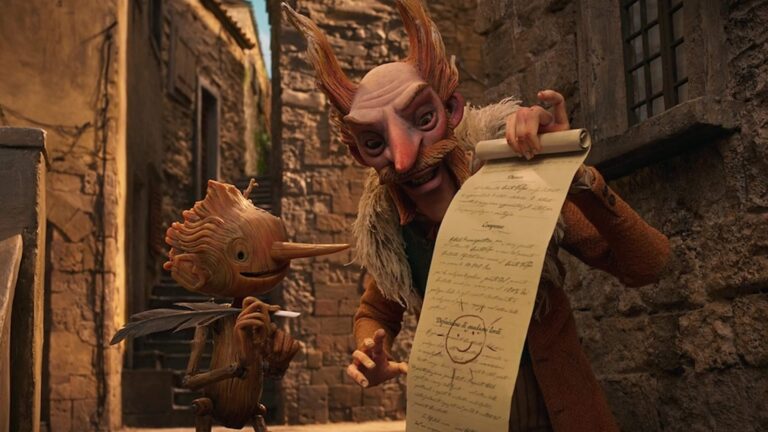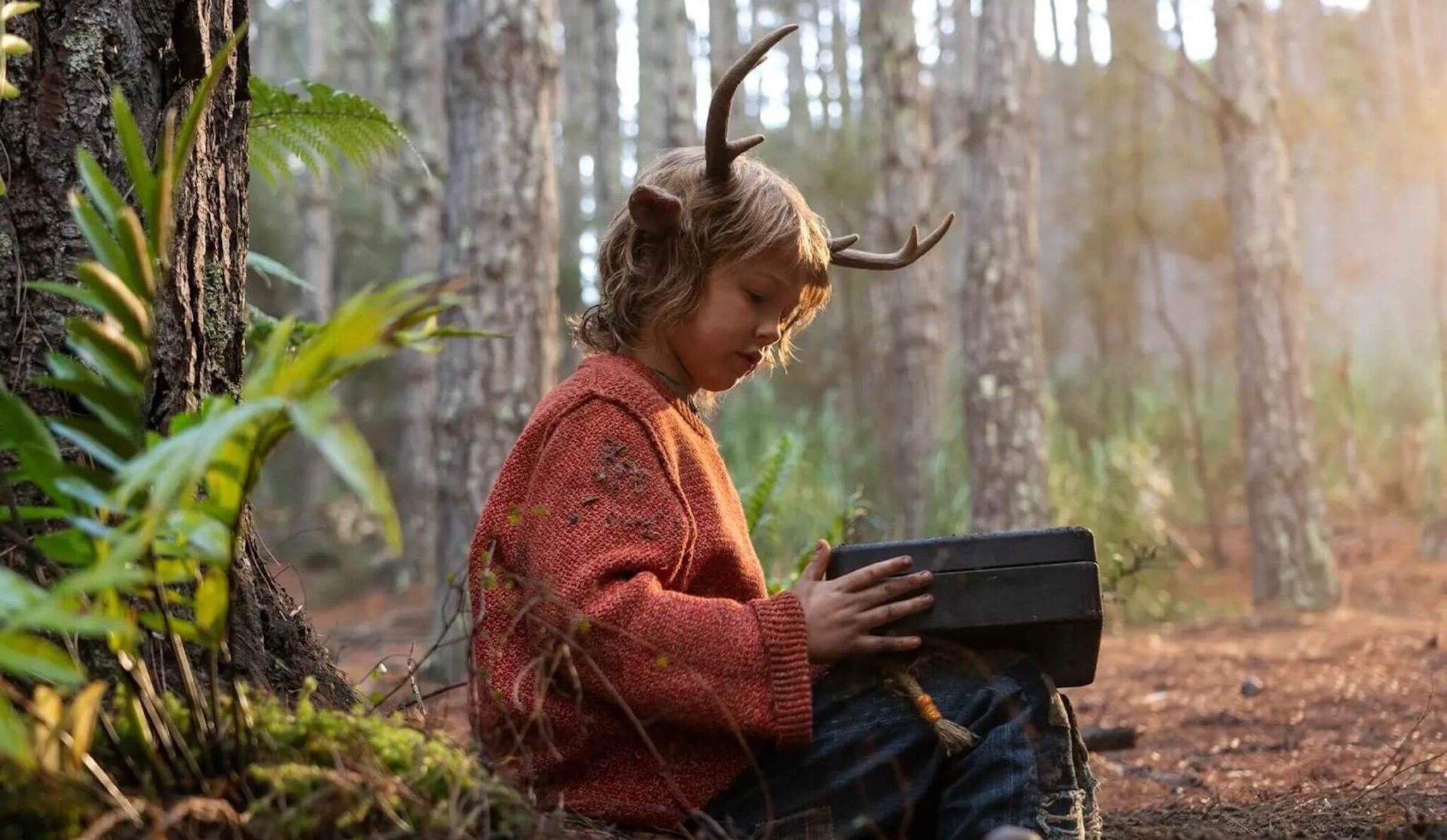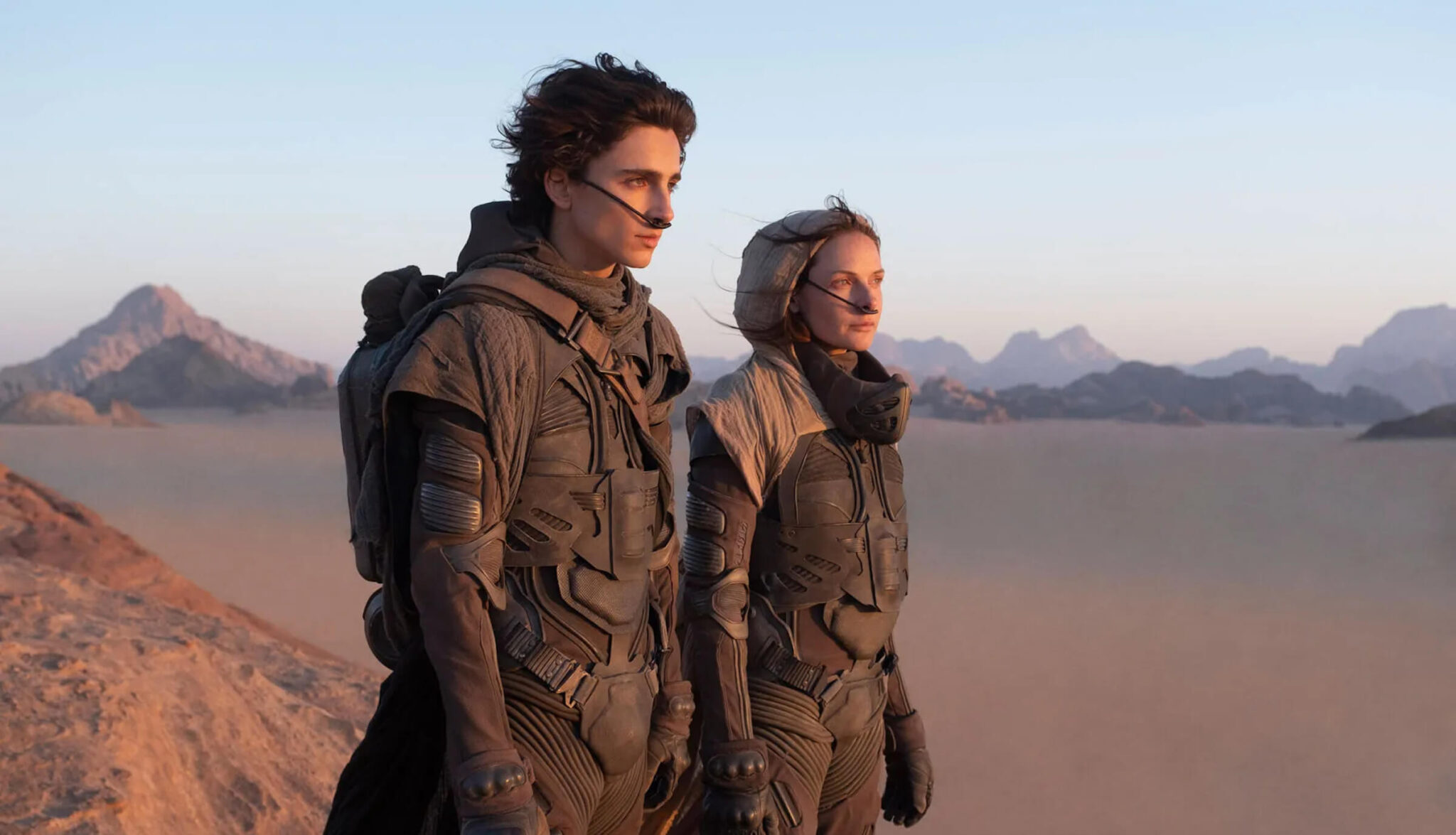Lessons from 2018 Oscar-nominated Screenwriters

In early February, Jeff Goldsmith, founder of Backstory Magazine and the host of The Q&A Podcast, hosted a live panel interview with most of the 2018 WGA and Oscar-nominated screenwriters in the Best Original and Best Adapted categories. It was a sold-out event, held at the LA Film School, sponsored by ScreenCraft (which is accepting submissions for its Fellowship until March 1st!), Final Draft, and of course, the LA Film School. Filled with hilarious moments, this 11th Annual Screenwriting Nominees Q&A provides delicious insight to anyone who is curious about the professional screenwriters’ process and approach to the craft.
The panel included Emily Gordon and Kumail Nanjiani (nominated for Best Original Screenplay for The Big Sick), Michael Green (nominated for Best Adapted Screenplay for Logan), Aaron Sorkin (nominated for Best Adapted Screenplay for Molly's Game), Virgil Williams and Dee Rees (nominated for Best Adapted Screenplay for Mudbound), and Vanessa Taylor (nominated for Best Original Screenplay for Shape of Water). It's worth noting that Aaron Sorkin is the only one that’s won an Oscar so far, and for everyone else, this represents their first Oscar nomination for writing.
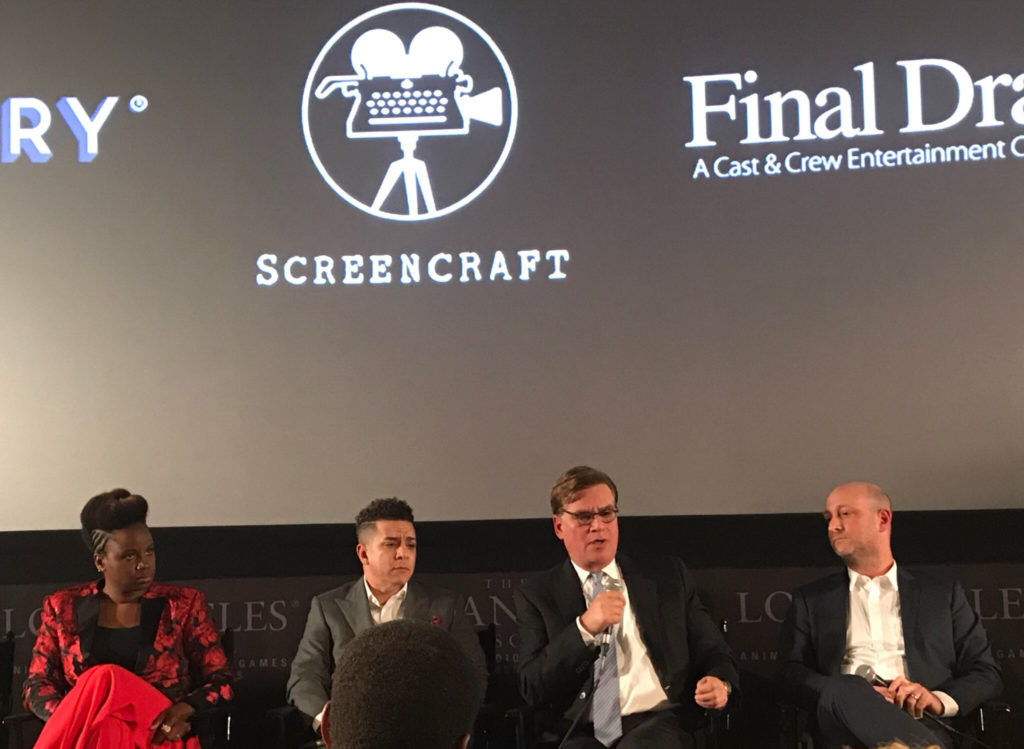
From Left to Right: Dee Rees, Virgil Williams, Aaron Sorkin, Michael Green
After introducing the guests and cracking a joke, Jeff starts on a euphoric note that sets the night up for some heavy dialogue. “It’s never easy to write or be a writer and people during the awards season tend to put you all on a pedestal and make it seem like it was easy, so for my first question, starting with Kumail Nanjiani… I think we’re going to start at What was your lowest point? What was the day as a writer that you weren’t sure you were going to continue to be paid as a writer?"
Kumail shakes his head, “Uh, first of all I want to say, um, what you said was incorrect ‘cause writing has always been very easy for me.” The audience bursts into laughter as he continues to fake-gloat. “This movie just kind of flowed out of us, you know, 3 days, we were done." As the laughter subsides, he gets real with the crowd. “No, I mean ... We’d been writing for a couple years already and we thought we had the script at a point where we really liked it and then we had a meeting with Judd Apatow and Barry Mendel, our producers, and we went into this meeting thinking they were like 'okay we wanna make this movie' and instead we got so many notes. So many big, big notes. The meeting was four hours. We thought it was going to be much shorter, and I remember after the meeting, Emily and I walked completely silently to the car and didn’t say anything the entire drive home. We’re driving from Culver City to Los Feliz.” Emily Gordon, adds “It’s an hour drive!” Kumail finishes, “ And we sat completely silently.” Jeff suggested that be the plot to the Big Sick 2 before moving on to Emily’s take on the lowest point in her career.
Doling out some #RealTalk, Emily says, “I think any time you get really, really massive notes on something, I always get so discouraged … I always appreciate the notes. Even if I really think the notes are spot on, which they almost always are, there’s just part of me that’s like (in a whiney voice) ‘I thought I did a good job and I didn’t'. So I found if I tackle the notes that same day, the work is always awful, whatever it is, so I always have to—the day I get notes—not even touch them that day. Just think about them, absorb them, because any day I get notes—again, great notes—I’m like, ‘this is awful and I should go home and never… just go back to my day job as a therapist (soft chuckle) every single time. So those are low moments for sure."
Moving on to Michael Green, who Jeff jokingly dubbed the laziest writer on the panel (he was a co-writer on American Gods, Blade Runner 2049, Logan and Murder on the Orient Express), he used a football metaphor. Talking about players getting ready for the big game and that moment in their lives where they’re being recognized for the work they're doing at that exact moment and comparing it to being a writer and finally being recognized for something that you did months or even years ago. “The peak moment of our effort looks like, you know, you forgot to shower and brush your teeth that day. It’s Tuesday. So just generally, it’s about waking up in your peak and no one knows it … every day is your Super Bowl and you get to wake up and be like 'I get to tell stories for a living. I did not have to go to medical school'. You know, my parents are almost at a point where they understand what I do for a living. They’re proud, they just don’t know exactly why ... it’s just about waking up and being excited for it. I don’t think there’s ever a day, you know, there are things you wrestle with, yes, there are the days where you get the punishing notes and you don’t have the solution for them yet, and that physically hurts, but boy it beats just about anything else I can think I would have to do.”
After some funny banter, which you’ll have to listen to the episode to hear, Aaron Sorkin admits, “Honestly, my lowest moment… this is going to sound like a joke, but it’s not… my lowest moment is now.” The crowd erupts with laughter as Jeff expresses his hurt feelings. Aaron continues, clearing up any misunderstanding, "And, it’s not, of course, I love being here, talking to you Jeff, and talking to everyone hear. What I mean is, when you’ve finished one thing and it’s just that blinking cursor again, and a blank screen … you get to be happy for about five minutes that you’ve finished something and you’re proud of it and it’s good, and it’s landed with the audience, and right now comes the moment of ‘I’ve used every word I know, in every combination that I can put them in. I don’t have an idea for a story… this is it. Now is when I get found out as a fraud … right now is when I’m not that much fun to hang out with.”
Virgil Williams was more than ready to agree with Aaron, but took it one step further. He jokes, “It started in 1995 and ended in 2001,” before elaborating, “I mean, I think it happens all the time, that day. I think that day is reoccurring, you know … there’s in-betweens, there’s ‘tweeners, that you have to sort of, you know, have provisions for. And it’s not just money, it’s like, sort of, faith… and faith. And faith … in yourself and whatever it is that you need to have faith in.”
Dee quickly comments, “I feel like all this is gonna get used for a Zoloft commercial.” After the audience laughs, she continues, “But I mean for me, probably like ten years ago when I had written Pariah and it was a 140-page script and I didn’t know scripts weren’t supposed to be 140 pages. And then the producer’s like 'okay, we’re going to have to trim this' and I’m like I did trim this from 160 pages to 140 … I was coming out at the time and I didn’t even know if anyone wanted to even hear the story and I was being told constantly they didn’t.” Sundance eventually acknowledged her talent by accepting her into their screenwriting lab, which really turned things around for her.
Vanessa Taylor finishes off this first question, agreeing with Virgil. “My lowest day was not a day, it was more like a whole year and I had actually very purposefully decided that I was going to change direction in my career. I was gonna go from only being offered Y.A. trilogies to, you know, Oscar-caliber material, and so my idea was that I’d take a year off and write something really brilliant. Well, you can imagine what came next. I didn’t really write too much of anything. And then I finally found a couple projects that I thought would be really great and meaningful and both of them sort of fell apart and didn’t end up being anything. And really, the thing that sort of came as a little lifeboat and ended this period of time, was actually Shape of Water."
Lightening the mood, Jeff teases with his next question, “What is your favorite thing to do to procrastinate?”
Vanessa looks at clothing on sale online. Dee plays online video games and looks online for condos she’d like to buy as motivation to get the job done. Virgil goes to the gym. Aaron watches Silicon Valley (which is music to Kumail’s ears). Michael plays online competitive Tetris. When it comes to Emily she says, “I do look at clothes online, I do play video games, but if no one else is going to say it, I’ll do it… I...” And we’ll stop right there. It’s raw, it’s real, and we all do it. But you’re going to have to listen to discover that for yourself. You’ll chuckle, nod, and possibly clap, just like the crowd did that night. Quickly jumping back to Aaron, who, treading lightly, had to admit that he does the complete opposite, “All I’m saying is… writing while a little bit horny… is helpful.” It only got a little weird, but that’s always a good thing. It really loosened the panel up for the rest of the night, allowing them to divulge lessons about life and writing in a way that freed the audience from any further expectations of the night. And because Kumail can’t be left out, his favorite way to procrastinate is surfing the web. All too real.
The rest of the night was filled with the panel sharing what inspires them and what they look to for inspiration, how they handled identity in their scripts, surprises that happened during production, personal connections to moments in their movies, great and terrible script notes that stuck in their mind, and finishing with the same question Jeff asks this panel every year. “If you’re hired as a rewriter to rewrite any of these other Oscar-nominated scripts, which are fantastic, as a fan, what’s a scene you might include or what’s something you might change?” Those answers are just too good to give away, so give it a listen and let us know how you feel about it all.
All in all, it was an incredible experience to listen to these nominees tell their stories and share some of their secrets. If you haven’t already stopped reading to go listen to it, we appreciate your dedication, but you really should grab yourself a snack, relax, and take it all in. The advice alone is worth your time.
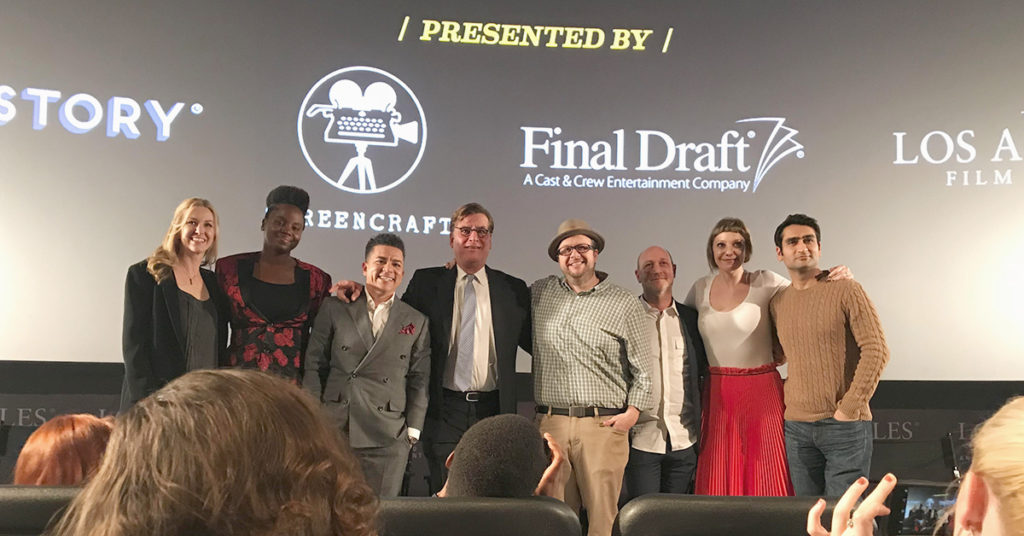
From Left to Right: Vanessa Taylor, Dee Rees, Virgil Williams, Aaron Sorkin, Jeff Goldsmith, Michael Green, Emily Gordon and Kumail Nanjiani.
Tags
Get Our Screenwriting Newsletter!
Get weekly writing inspiration delivered to your inbox - including industry news, popular articles, and more!



















